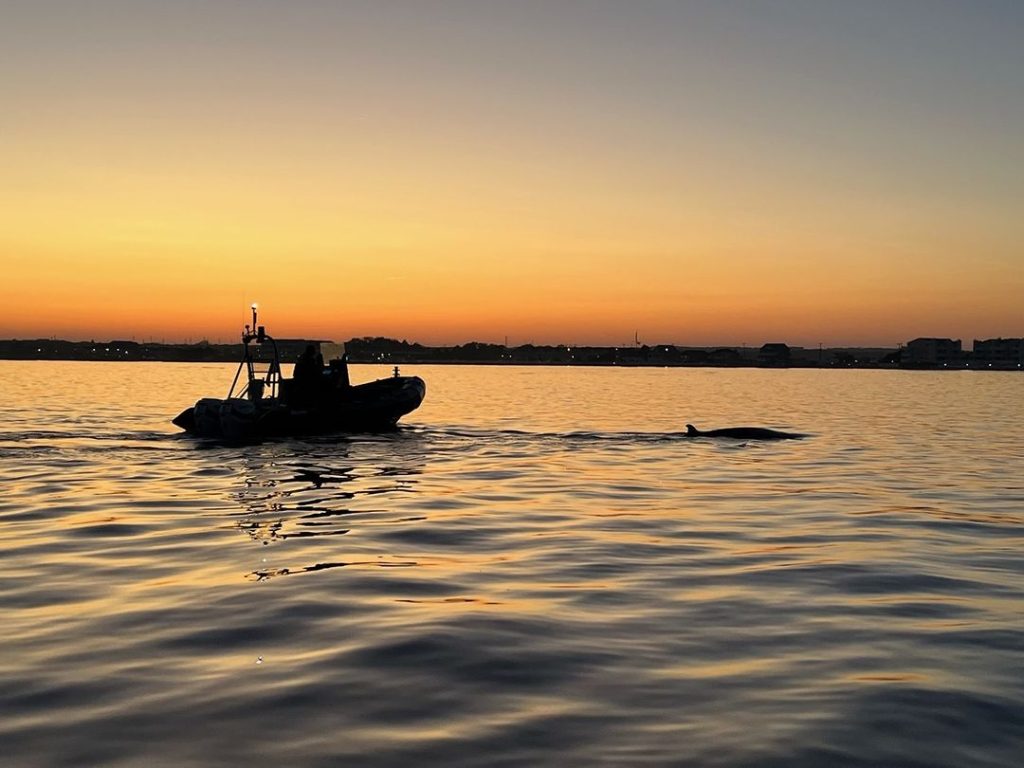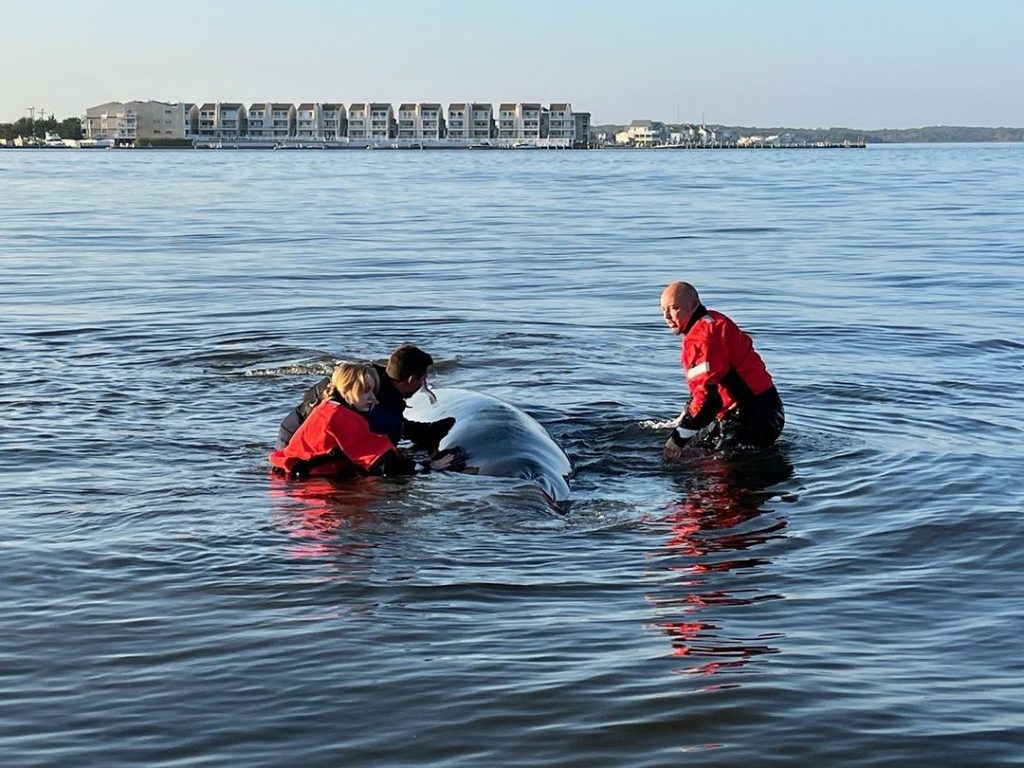
Volunteers help refloat a minke whale that had become stranded behind Island Beach State Park in Barnegat Bay, Oct. 1-7, 2023. (Photo: Marine Mammal Stranding Center)
A minke whale that had been spotted in Barnegat Bay twice in a matter of as many days and, with the help of government agencies, private rescuers and TowBoatUS, was led back to sea, returned to the bay and had to be euthanized, the Marine Mammal Stranding Center said.
The 22-foot whale is the latest to find itself stranded locally, ironically just before a rally took place in Point Pleasant Beach, with U.S. Rep. Chris Smith (R-4) calling for a moratorium on sound-based research for offshore wind turbine development until it can be determined if marine mammals are being caused harm.
According to a lengthy statement from the Marine Mammal Stranding Center, a nonprofit based in Brigantine that is the state’s designated partner for rescuing and treating stranded and injured marine mammals, the female minke whale was first reported stranded in shallow water in Barnegat Bay near Conklin Island, just inside Barnegat Inlet, on Sunday, Oct. 1. For five days, the group’s experts, with the aid of several agencies, were on scene attempting to assist the whale back into the ocean.

Volunteers help refloat a minke whale that had become stranded behind Island Beach State Park in Barnegat Bay, Oct. 1-7, 2023. (Photo: Marine Mammal Stranding Center)
“MMSC’s Stranding Team spent hours in the water helping to free the whale from shallow water multiple times,” the statement said. “With each successful refloating of the whale into deeper water, the following day she would be found restranded again in shallow water. With each attempt, the minke whale grew weaker and her body condition began to decline, with skin sloughing off the exposed parts of her body.”
With each grueling rescue attempt, the whale grew more lethargic and eventually found it difficult to even open her eyes, the statement said. On Thursday, the whale was located approximately 1 mile inside the inlet west of Sedge Island, also inside Barnegat Inlet, behind Island Beach State Park, stranded again in shallow water and non-responsive.
“The whale was assessed by MMSC’s veterinarian and determined from his examination that she was suffering and could not recover from the multiple stranding events,” the statement went on the say. “The whale was humanely euthanized.”
The whale was towed to Island Beach State Park on Thursday evening and secured overnight. Due to the euthanasia, burial on the beach was not an option as the chemicals in the euthanasia drugs can pose a risk to the ground water and wildlife. On Friday morning the whale was transported to the Monmouth County Reclamation Center where the necropsy was performed by Marine Mammal Stranding Center staff and volunteers.

Volunteers help refloat a minke whale that had become stranded behind Island Beach State Park in Barnegat Bay, Oct. 1-7, 2023. (Photo: Marine Mammal Stranding Center)
Traditionally, deceased whales and other marine mammals are buried on the beach where they are stranded, if possible. The necropsy at the Monmouth County site was performed Saturday.
Initial findings, according to MMSC, showed froth in the lungs and a heavy parasite load in the GI tract (stomach and intestines). There were fish bones in the stomach, and feces in the colon. No signs of trauma were observed. Samples were collected and will be sent for histopathologic analysis.
When results become available, they will be shared via the MMSC website at the following link: https://mmsc.org/cetaceans-2002-2023
“To say that it has been an extremely busy and taxing week for our team is an understatement, and we thank every single person that assisted us in the field or offered moral support to our team as we navigated this stranding event over the course of six days,” the statement said. “Our small team has been out in the field for the bulk of this week, so social media updates and media interviews come when we have the time.”
The attempts to save the whale, and ultimately see that it received a time necropsy after it had succumb to the strandings, included a multitude of agencies. MMSC credited the NJ State Police Marine Unit, NJ Fish and Wildlife Conservation Officers, Sea Tow, U.S. Coast Guard, the Ocean County Mosquito Commission, NOAA Fisheries Law Enforcement, Island Beach State Park, Monmouth County Reclamation Center, Tri-State Carting & Recycling, “and our dedicated volunteers” for their assistance.

Advertisement

Ortley Beach & North Beaches
Landmark Ortley Beach Breakfast Spot Looks to Expand

Ortley Beach & North Beaches
‘Temporary’ 70-Foot Cell Tower on Route 35 in Ocean Beach OK’d to Return

Seaside Heights & Seaside Park
Beloved South Seaside Park Restaurant Will Remain Open As Developer Seeks to Demolish Block

Seaside Heights & Seaside Park
In Seaside Heights, A $50M Flagship Building Rises Over the Boulevard in a Famed Location

Police, Fire & Courts
Ocean County Sheriff Establishes Drone Command Center in Seaside Heights Amid New Video





